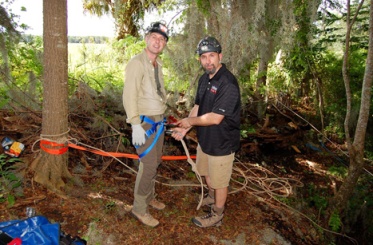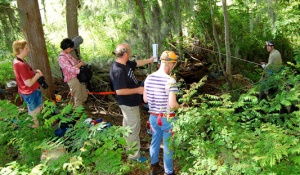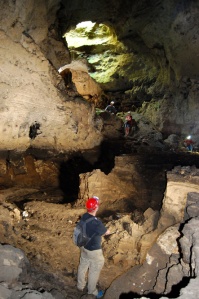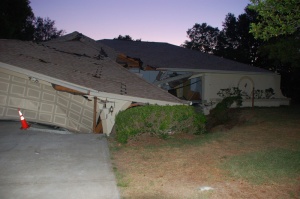Biology
WKU professor appears in BBC documentary about sinkholes
- Tuesday, February 11th, 2014
In recent months, dramatic stories about sinkholes headlined newspapers all over the world. These destructive collapses continue to be a focal point for media outlets covering the damage and deaths caused by their occurrence. The thought of being swallowed by the ground, or losing your car or house to a sinkhole, tends to elicit reactions ranging from minor discomfort to terror.

Dr. Jason Polk (right) assists BBC documentary host Dr. Iain Stewart with a harness to descend into the void below during filming of “Swallowed by a Sinkhole” in Florida. (Photo by Tom Turner)
Last week, Dr. Jason Polk of WKU’s Department of Geography and Geology appeared in a BBC documentary about Florida sinkholes. The BBC Horizon series focuses on scientific issues and their future effects.
Dr. Polk also provided consultation on the program’s content, which is meant to educate the public about the seemingly mysterious ways in which these potentially deadly landforms occur. More importantly, the program also aims to raise awareness of the dangers of sinkholes, as well as the importance of the fragile, unique landscapes in which they form.
Sinkholes occur naturally when the ground surface collapses into voids in the rock below and can be found across a large portion of the world. Yet, these common features are often unknown to people who live in areas prone to sinkholes. For those who are aware, sinkholes are used as garbage dumps and natural stormwater drains. Others just completely ignore them as potential environmental hazards.
The BBC Horizon program “Swallowed by a Sinkhole” tells the story of Jeff Bush of Seffner, Fla., who was killed as he slept in his bed when a sinkhole opened up in the middle of the night in February 2013 and consumed part of his home. Since that time, several major sinkhole collapses, including recent ones near Walt Disney World Resort and in China, increased their notoriety throughout the world and earned the media’s attention. Sinkholes have occurred for thousands of years, and certainly have been the focus of news stories at different times in the past. The recent string of collapses around the world has sparked new concern about the frequency and dramatic nature of their development, and the role of human action in causing these occurrences, as well as sinkhole impacts on life and property.

The film crew, led by Director Ed Booth, sets up the descent shot for Dr. Stewart, who hangs from the rope. (Photo by Tom Turner)
“The recent attention on sinkholes, although scary for some, provides a much-needed focus on the broader issue of educating people about the type of landscape found in Florida and elsewhere,” Dr. Polk said. “For many, this should be an environmental wakeup call that involves water, geology and human interactions at many scales.”
In Florida, as in Kentucky and many other areas of the southeastern United States, limestone bedrock dominates the geology. This type of rock can easily form caves, sinkholes and large aquifer systems when it is slowly dissolved by rainwater that becomes slightly acidic from carbon dioxide in the air and soil. Natural sinkhole occurrences are exacerbated by changes in rainfall, groundwater usage and human impacts, such as urbanization and agriculture. These sinkhole- and cave-riddled landscapes are known as karst regions. Karst landscapes are of profound importance because they supply over 25 percent of the world’s drinking water. This supply comes from groundwater flowing in voids and cavities in the rock, which creates large aquifer systems and beautiful, blue springs that sometimes emerge from the ground.

A view from below of the collapsed entrance, inside the cave, with perspective of its size provided by director Ed Booth in the foreground. (Photo by Tom Turner)
Dr. Polk was excited to return to Florida, where he spent many years working on karst-related issues while pursuing his Ph.D. His primary focus was to provide consultation on the geology and geomorphology of Florida’s karst landscape and to help the film crew actually descend below the surface and experience a collapse firsthand at a large cave in west-central Florida. Local cavers from The Karst Conservancy also assisted with this effort, which required a team to safely help the film crew and host, Dr. Iain Stewart, to enter the underground through a vertical collapse and experience a subterranean void firsthand.
“It was an unexpected privilege to be able to share my research and passion with the world by working with such a fantastic and knowledgeable BBC crew,” Dr. Polk said. “They really did their homework before we met for filming and the end result is a documentary that highlights one of the most important and pressing hazards faced by those living in karst areas. Changes in land use, development and climate are only going to exacerbate the problems we see with sinkhole formation. Water resource management is really the main message of the story, as it drives a lot of sinkhole formation. Being able to provide this information to the general public in a way that is easily understood is challenging, but necessary. I feel this documentary does an excellent job of that, while also paying respect to those, like Jeff Bush, who have been victims of such a terrible tragedy.”
Dr. Iain Stewart, Professor of Geosciences Communication at Plymouth University in the United Kingdom, hosted the BBC Horizon sinkhole special. “It was an honor meeting Dr. Stewart and being able to discuss the importance of Florida’s geology and aquifer with him. He brings vast experience to global environmental issues, and his and the crew’s dedication really made the experience all the more rewarding in knowing that the final product would be fun and educational,” Dr. Polk said.
For more information on Florida sinkholes, Dr. Polk recommends referencing Florida Sinkholes: Science and Policy (2013) written by Hofstra University professor Dr. Robert Brinkmann. To learn more about Florida’s karst landscape, Dr. Polk recommends a chapter he wrote (co-authored with Dr. Brinkmann) in Coastal Karst Landforms published by Springer last year that provides a nice overview.
The “Swallowed by a Sinkhole” program will air in the United States on major networks after its run on the BBC, likely sometime this spring. For episode information, visit the BBC Two Horizon website at http://www.bbc.co.uk/programmes/b03tz705 or see channel program listings.
“These types of public outreach opportunities not only help to educate our communities about key issues that impact life and livelihood, but they also highlight the significant expertise on issues like karst, sinkholes, and water resources that WKU faculty like Dr. Polk provide to the wider world,” said Geography and Geology Department Head Dr. David Keeling.
Contact: Dr. Jason Polk at jason.polk@wku.edu, (270) 745-5015 or @ProfJasonPolk on Twitter.


